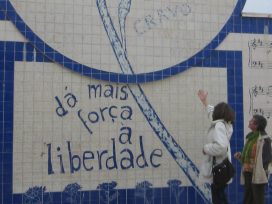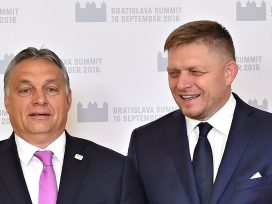The murder of Ivo Pukanic, the well-known journalist and publisher of the weekly magazine Nacional, on 23 October 2008 reawakened interest in Croatia about the fine line that separates politics, business and the media from the mafia, crime and corruption.
This troubling question, which has still not been answered, raised suspicions among the public that the authorities are not really prepared to fight the evil that claimed four lives in Zagreb in less than a month. Two weeks earlier, the daughter of a well-known and politically involved lawyer was executed at point-blank range; a top manager was badly beaten up and another journalist was almost killed. The speed and efficiency with which the police initially tracked down the murderers of Pukanic and his employee Niko Franjic did, however, give grounds for optimism.
In the past, the authorities have shown the political will to solve murders by bringing people who know their job to the helm of the police and interior ministry. The country’s new police chief, Vladimir Faber, for example, did a terrific job in solving Osijek war crimes; his work resulted in the trial of the retired general and Sabor deputy Branimir Glavas. The question now is whether the authorities will allow investigations into the latest murders in Zagreb to go as far, especially when such probes may lead to the door steps of high-profile personalities.
The dilemma was defined by author Slavenka Drakulic, well known for her trenchant criticism of Croatia’s authorities. She wrote in The Guardian that Pukanic, “was known for being well-connected, with one leg firmly in the criminal world and the other in the political one”. Drakulic continued: “It is a symptom of something much bigger and more serious, of long-standing criminal activity going unpunished […] In the past few years, killings of mafia bosses have occurred in the centre of the city, but perhaps not close enough to the circles of power. Ivo Pukanic’s murder, however, seems to be too close to it.”
The author, albeit indirectly, thus enters into the polemics surrounding Croatia’s president Stjepan Mesic, who was Pukanic’s close friend and who attended his funeral. Shortly after Pukanic’s murder, in a dramatic address to the nation, Mesic said the time had come to wage war on the mafia, which would mean “us or them”. Some have suggested the term was far from precise, since it remains difficult to determine who is “us” and who is “them”.
Mesic attempted to clear this up by saying that “us” meant the legal state, the functioning of institutions and the safety of ordinary citizens, while “them” referred to criminals, terrorists and mobsters. Nevertheless, the line remains blurred in Croatia. Significantly, prominent members of the Zagreb underworld were seen standing only a few rows behind the president at Pukanic’s funeral.
According to the columnist Jelena Lovric, Pukanic was a “bridge” between those whom Mesic describes as “us” and “them”. She goes on: “He was a friend both of major members of the criminal milieu and of the highest representatives of the authorities.” Lovric added that while one of the more notorious members of the Zagreb criminal underworld was writing him “confidential letters”, Pukanic was simultaneously “intimate with Mesic, seeing him at dinners and publicly on first name terms with him”.
That Pukanic was “not only a journalist” is not seriously questioned in Croatia. Heni Erceg, former editor of the now defunct weekly Feral Tribune, says Pukanic was “friends with mafia bosses, but also with influential politicians, which in Croatia too often turn out to be one and the same”. She claims the distinction Mesic drew between the legal state, the functioning of the system’s institutions and the safety of citizens on the one hand, and crime, terrorism and mafia on the other, is almost invisible, and that the categories are interwoven and often merged in Croatia.
In an interview with Novi list, Jasna Babic, a veteran journalist with Nacional, also described her late boss as a person who had equally good connections with the criminal milieu and high-level politics. Pukanic did not try to hide the latter, when, during guest appearances in numerous television shows, he spoke of his connections with Mesic and prime minister Ivo Sanader, addressing the former familiarly as “Stipe” and the latter as “Ivo”.
However, the investigation into his murder has uncovered contacts with the other side as well. One murder suspect, Robert Matanic, has requested the position of state witness, to which the prosecution is allegedly willing to agree if he will reveal who ordered the murder. Where this lead will take the police and whether we shall find out who really ordered the murder remains to be seen; it will not be easy, says former policeman Josko Moric.
No official state of emergency was declared after the murder of Pukanic, nor after that of Ivana Hodak, the 26-year-old daughter of a well-known lawyer defending General Vladimir Zagorac and Ljerka Mintas Hodak, the former deputy prime minister and minister of European integration. Nevertheless, the country was under a virtual state of emergency. Police flooded Zagreb, helicopters flew over the city and police armed with rifles patrolled the main streets; there were new arrests every day, along with frequent searches of apartments and cars. Although there was no official curfew, people stayed off the streets after dark. Television programmes and front pages were full of information on the state’s war on the mighty mafia.
The murder of Pukanic, which happened shortly before Croatia’s most recent negotiations on EU entry in early November 2008, were an embarrassment to a government that has invested so much effort in Croatia’s rapid integration with the European Union. But while European Commissioner Olli Rehn pointed to deep-seated problems with crime, police and the courts, he made it clear he did not expect this to impede Croatian entry by 2011 at the latest.
Prime Minister Ivo Sanader, meanwhile, has pledged not to allow Zagreb to become a new Beirut. The measure of his success will depend on whether the murder of Ivo Pukanic results in the capture of some big fish, or whether, as in so many similar situations in the past, it serves only to net the minnows while the big fish resume their hunting undisturbed.
This article is an updated version of the one published in “Balkan Insight”, the website of the Balkan Investigative Reporting Network (BIRN) on 6 November 2008.






